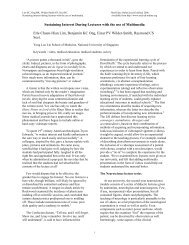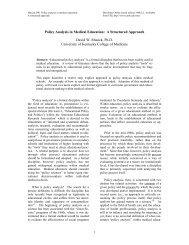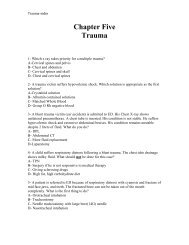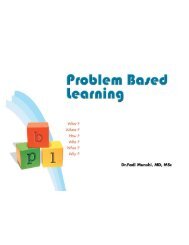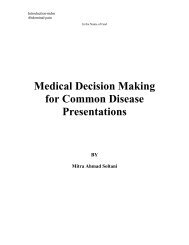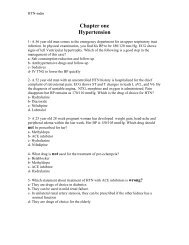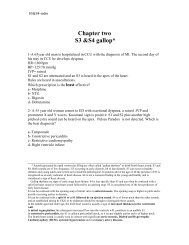Characteristics of Students Failing Medical Education: An Essay of ...
Characteristics of Students Failing Medical Education: An Essay of ...
Characteristics of Students Failing Medical Education: An Essay of ...
Create successful ePaper yourself
Turn your PDF publications into a flip-book with our unique Google optimized e-Paper software.
Mcloughlin CS. <strong>Characteristics</strong> <strong>of</strong> <strong>Students</strong> <strong>Failing</strong> <strong>Medical</strong> <strong>Education</strong>:<br />
<strong>An</strong> <strong>Essay</strong> <strong>of</strong> Reflections.<br />
may be tested, I will first provide some reflections on basic<br />
themes characterizing students who experience difficulty<br />
attaining and maintaining academic success.<br />
Some Basic Themes<br />
It is almost never necessary to use exhaustive, diagnostic<br />
testing‐to‐limits to discern the nature <strong>of</strong> the specific<br />
problems experienced by medical students in severe<br />
difficulty. The student who is failing for apparently unaccountable<br />
reasons is rare indeed. Generally, the problems<br />
are so dramatic that the causative agents are identifiable<br />
with minimal detective work. With problems clear from<br />
the outset, the primary task is in checking that, in fact, the<br />
apparent precipitating problem is the real cause. Thus, it<br />
is generally true that presenting problems are discernible<br />
from the individual’s history; if you read for clues then the<br />
data are incontrovertible. Of course, that does not mean<br />
that the problems are simple to remediate—only that they<br />
are relatively easy to differentiate.<br />
<strong>Failing</strong> students appear to value a frank, candid appraisal.<br />
When discussing with a student the ‘clues’ that I<br />
see in their background their response is all too frequently<br />
a sincere lack <strong>of</strong> appreciation <strong>of</strong> the double-edge embedded<br />
in the evaluations they have received from Pr<strong>of</strong>essors,<br />
Clinical Directors, and their <strong>Medical</strong> School Dean.<br />
Typically the ‘clues’ implying a prospect for failure are<br />
embedded in coyly worded statements that intimate, but<br />
rarely fully-explain the depth and implication <strong>of</strong> the unsatisfactory<br />
performance. Statements that objectively and<br />
quantitatively identify a failing standard are tempered<br />
with qualitatively phrased compliments that act to diminish<br />
the impact <strong>of</strong> the intended message. Appraisals are<br />
cloaked in positive, kindly terminology; and, it is almost<br />
solely the positive upon which the student has focused.<br />
In their reading <strong>of</strong> written evaluation all they see is the<br />
encouraging tenor. Is this a case <strong>of</strong> selective attention?<br />
Almost certainly it is; however, the responsibility for accurate<br />
communication lies equally with the message-provider<br />
as it does with the recipient. It is likely that faculty<br />
concern to ensure that messages are conveyed ‘positively’<br />
in fact blunts the message’s true intent.<br />
Typically, the individual who is failing is no less<br />
committed to their success as a medical student than any<br />
peer. While highly motivated to be successful in academic<br />
study and examinations, this student rarely thinks<br />
further ahead than graduation. Only infrequently do they<br />
visualize themselves as a medical provider; rather, they<br />
are overly focused on being an acceptable medical student.<br />
Superiority, they presume, can directly be equated<br />
to a facility to remember increasingly higher mountains<br />
<strong>of</strong> facts.<br />
Med Educ Online [serial online] 2009;14<br />
doi;10.3885/meo.2009.L0000029<br />
Available from http://www.med-ed-online.org<br />
It should come as no surprise that intelligence, as<br />
measured by IQ tests and reflected in secondary education<br />
grades, is an imperfect measure for predicting success in<br />
medical education. Native ability is clearly a necessary<br />
but insufficient criterion for performing well in medical<br />
school. In fact, whereas medical students do not have to<br />
be located in the IQ stratosphere to be successful, they<br />
do have to be exceptionally well organized in their management<br />
<strong>of</strong> information. For many medical students, success<br />
has come at the expense <strong>of</strong>, and sometimes despite,<br />
grossly inefficient study habits. The existence <strong>of</strong> efficient<br />
study habits or a willingness to‘re-learn’ study systems<br />
are themselves critical indicators for identifying a candidate<br />
likely to benefit from remediation strategies.<br />
Most students who approach the stage <strong>of</strong> no‐return<br />
in medical studies say they were not particularly academically-stretched<br />
prior to entering medical school. Consequently,<br />
we should never be surprised that most approach<br />
their medical studies using the exact same strategies as<br />
they used (albeit successfully) in secondary education<br />
settings. That is, they generally practice a strategy <strong>of</strong><br />
‘when in doubt simply read, read and read again.’<br />
The failing student rarely expected to fail. This novel<br />
experience <strong>of</strong> failing is emotionally painful and <strong>of</strong>ten<br />
without precedent for the medical school failure. Consequently,<br />
it is common to see avoidance <strong>of</strong> contact with<br />
peers, and a parallel demeanour toward the school’s academic<br />
review and promotions process. <strong>Failing</strong> students<br />
have a generalized reluctance to approach appropriate<br />
academic personnel for advisement—despite their clear<br />
recognition <strong>of</strong> its importance. The feeling <strong>of</strong> abandonment,<br />
experienced by many failing medical students,<br />
causes some to drop out completely from all study related<br />
activity, which further compounds their difficulties.<br />
The failing-group includes a disproportionate number<br />
<strong>of</strong> individuals from vulnerable social situations, and a<br />
high proportion <strong>of</strong> persons living fringe-lifestyles. They<br />
appear overly represented by women and racial minority<br />
individuals, non‐traditional students in terms <strong>of</strong> age<br />
and background preparation, those in socially demanding<br />
family arrangements, people without a ready social<br />
resource system, individuals lacking a family-legacy in<br />
medicine, and those living with non‐medical roommates.<br />
Since an active social and academic resource system<br />
is more typical for those who experience success, then<br />
there is no surprise that the failing group includes many<br />
loners. While not flattering, I have heard many students<br />
in marked academic difficulty portray themselves as ‘socially<br />
retarded.’ Almost universally these are also individuals<br />
who are not part <strong>of</strong> any organized study group<br />
2



